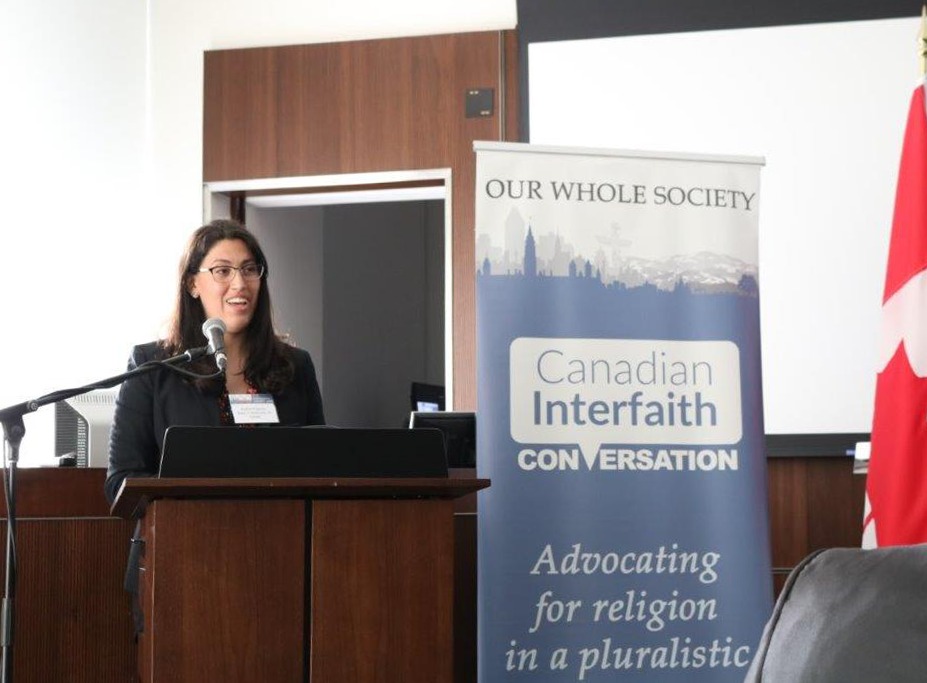The seventh iteration of Our Whole Society, a national conference dedicated to examining the role of religion in Canada’s public discourse, took place as a hybrid event from 11-12 May 2022.

First held at McGill University in 2013, the conference has engaged hundreds of people in an exploration of the relationship between the insights and experience of religion and the challenges confronting Canadian society. It is sponsored by the Canadian Interfaith Conversation and has been actively supported by the Bahá'í Community of Canada’s Office of Public Affairs since its inception.
This year, the conference launched with a hybrid event held in collaboration with the All-Party Parliamentary Interfaith Caucus. A small reception held on Parliament Hill hosted a handful of Parliamentarians and a few dozen representatives of various faith communities. Following the reception, MP Sameer Zuberi introduced a live virtual presentation by Dr. Ahmed Shaheed, UN Special Rapporteur on Freedom of Religion or Belief.
Dr. Shaheed reflected on his work promoting freedom of religion or belief in countries around the world. He stressed the importance of proper documentation and monitoring of abuses on the basis of religion, and the need for better training of diplomats to navigate the nuances of religious and theological differences.
As a UN Special Rapporteur – first for Human Rights in Iran and subsequently for Freedom of Religion or Belief – Dr. Shaheed has reported extensively on the persecution of Baha’is in Iran and in other countries. In his remarks he observed the importance of holding governments accountable for their human rights abuses, in part because it also helps the victims of persecution to feel safer knowing that abuses are not going unnoticed.
“Human rights work is like having a drop of water drop on a stone,” Dr. Shaheed said. “If it keeps on dropping, eventually it makes a difference. My work is not seeking an outcome per se, it is a process. If we don’t see it in that spirit we can become despondent.”
Prof. Irwin Cotler, Canada’s Special Envoy on Preserving Holocaust Remembrance and Combatting Antisemitism,responded to Dr. Shaheed’s remarks by stressing the important role played by the UN Special Rapporteurs who document human rights abuses in order to foster international accountability.
The second day of the conference featured presentations on the response of religious communities to the challenges of the pandemic, and specifically how they have fostered patterns of unity.
“This year’s conference allowed us to reflect at both a conceptual and a practical level about the positive contributions to societal unity that have been inspired by religious faith across the country,” said Geoffrey Cameron, Director of Public Affairs for the Bahá’í Community of Canada and chair of the conference program committee.
John Longhurst, Faith Reporter for the Winnipeg Free Press, noted that religion is often covered in the press when something goes wrong. In the context of the pandemic, he estimated that most faith communities abided by public health orders and sought creative ways to build collective resilience. He reflected on the need for more positive stories about the contributions of religion in society.
Dr. Joanne Langley, an academic pediatrician, co-Chair of Canada’s COVID-19 Vaccine Taskforce, and a member of the Baha’i community, also observed the role that faith communities have played in being outward-looking despite the conditions of the pandemic. She also stressed the importance of finding a “point of common ground where there is not an oppositional dynamic” when challenging issues have arisen.
The conference also proceeded to hear from diverse grassroots experiences of faith communities that have sought to expand access to worship and devotional services, feed the homeless and in need, and mobilize support for vaccine equity around the world.
“We need to build on our common humanity,” added Nina Karachi-Khaled, President of the Canadian Council of Muslim Women. “When we see each others’ common humanity we are able to work out perceived differences and misunderstandings better.”

